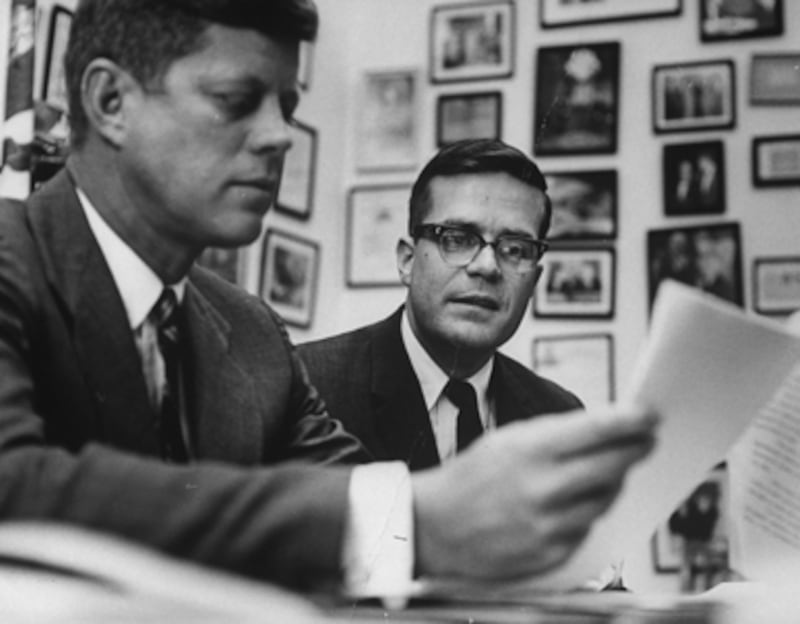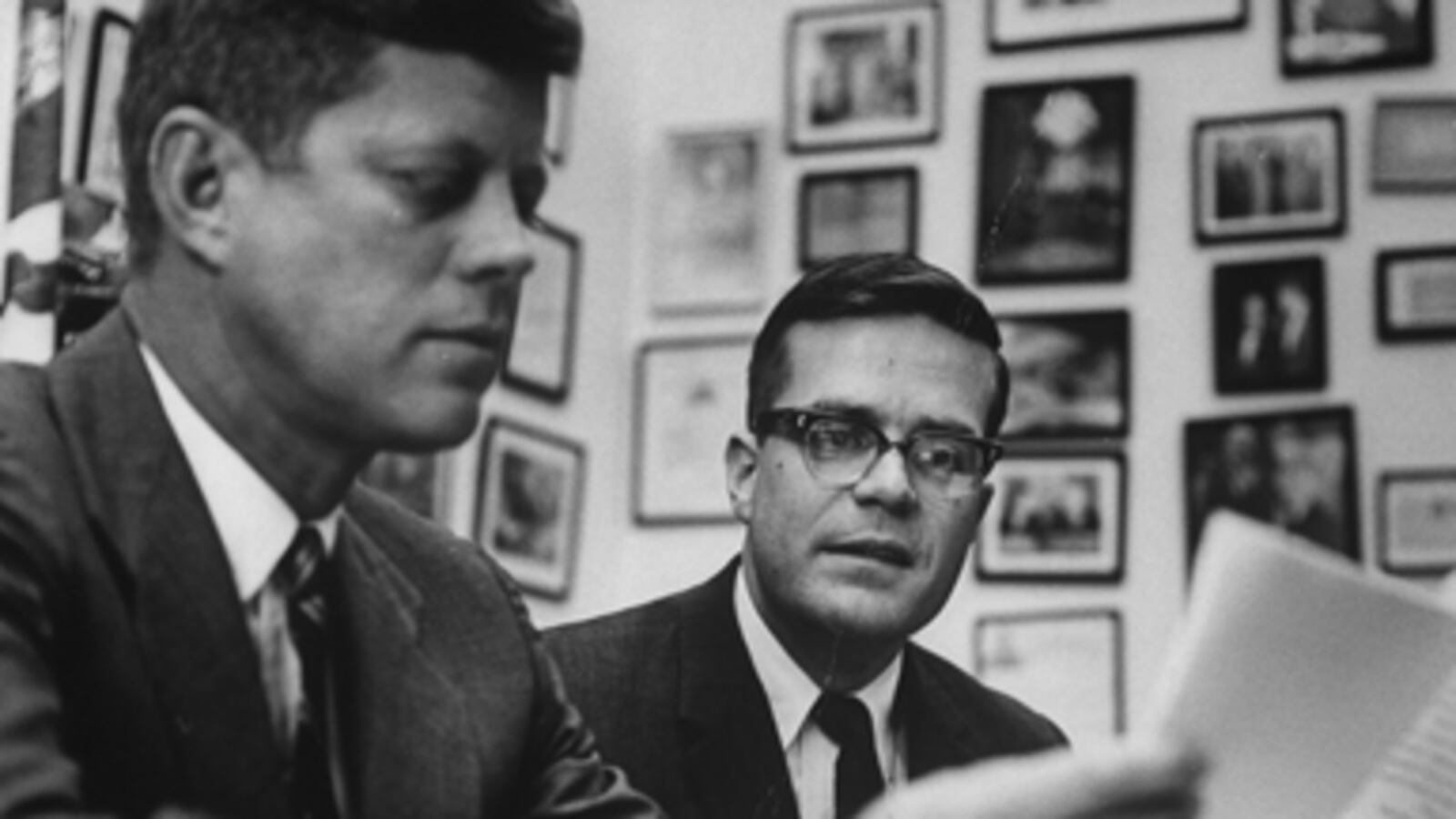Today, as wordsmiths, politicos and Kennedyophiles alike remember Ted Sorensen for the eloquence of his speeches, I am chuckling to myself about the eloquence of his humor.
I was ten or eleven years old when I first encountered a style of humor so sophisticated, I couldn’t quite figure out why it was funny. In the bookcase of our shag-carpeted living room, an entire shelf was filled with books about John F. Kennedy’s Camelot and my favorite by far was a smallish book entitled The Kennedy Wit. Edited by Bill Adler, the book captured Kennedy’s charismatic verbal style and showcased his engaging, irrepressible, hyper-ironic and recklessly self-effacing wit. ( A question from a young boy: “How did you become a war hero?” Kennedy: “It was absolutely involuntary. They sunk my boat.”) I had come of age in Richard Nixon’s America, so just imagine my shock when I learned that a president could be funny!
Somewhere inside that book was a line destined to become one of my very favorite jokes of all time, delivered by Kennedy at something called a Gridiron Dinner—and only years later did I fully understand the context. The year was 1958 and then-Senator Kennedy was already at the front of the pack for the Democratic presidential nomination two years away. Inside this white-tie ballroom full of everyone who mattered in Washington D.C., the consensus opinion of young Jack Kennedy was that he was both pawn and proxy for his powerful, unscrupulous father Joe. But that did not stop Kennedy from delivering a joke that night that was nothing less than audacious. Pulling a piece of paper from his pocket, he read a telegram he said had been sent by his father regarding the upcoming 1960 presidential election:
“Jack – Don’t spend one dime more than is necessary. I’ll be damned if I am going to pay for a landslide.”
• Richard J. Tofel: Remembering the WordsmithI could only imagine the tsunami of laughter that must have shaken the walls of the Capital Hilton. Yes, it was brilliantly funny – but upon further reflection it was also a revelation. And to those who have ever attempted to practice the art, it is the Rosetta Stone of political humor. Just imagine what might have happened that night if someone else had gone to the podium and told that very same joke. It would have been repeated a million times over, each time at Kennedy’s expense. Instead, Kennedy took the punch-line for himself and applied the loud laughs he earned as an inoculation against a poisonous idea. Indeed, if anyone who had yet to speak had planned to joke about the ripe topic of JFK’s rich daddy, they had little choice but to cross it from their draft. But of course, for any other politician to arrive at such a joke, they would have needed a speechwriter on par with Kennedy’s.
My professional career as a would-be Sorensen also began on the presidential campaign of another Massachusetts Democrat named Mike Dukakis. I was a lowly press office staffer who wormed his way into the speechwriting operation and found my first opportunity to pen jokes for our candidate in the preparation for his appearance at New York City’s answer to the Gridiron Dinner—the Al Smith Dinner—also white-tie and attended by the power elite. Huddling around a computer screen with my speechwriting colleagues, I recalled the JFK Gridiron line as we tried our best to meet its standard for audacious self-directed humor. Here’s my best recollection of what we tapped into the keyboard:
“I’ve been called arrogant.. but I know better.”
I’ve been called a technocrat—but where is the data to back that up?”
I have been called humorless—and quite honestly, I fail to see what’s so funny about that. ....Many decades ago Al Smith stood up for the little guy. Ladies and gentlemen, I am that man!
Not bad for the handiwork of an ill-fated campaign. But of course, I never did get to write jokes for President Mike Dukakis. Instead, my denied Dukakis dreams were realized four years later when I was appointed to the unlikely job of assisting President Bill Clinton with his speeches to the Gridiron dinners, the White House Correspondents’ Dinner, and the like. There, seated at a desk deep in a back room of the White House speechwriting office, I summoned the audacity to place a phone call to Ted Sorensen. When his assistant informed him a White House scribe was on the line, he took the call without delay and he found time to school me further in an art he had perfected decades earlier. This was the first in a series of phone calls and office visits I had with Ted Sorensen. And of course, his insights were always keen and his wit was never less than razor sharp.

I recall one instance when I was riding my bicycle around Central Park on a beautiful sunny day when I saw Mr. Sorensen walking north on his way home from his office. I pulled over to chat and he told me he had just returned from a rafting trip with his family. Without missing a beat, he connected the dots: “Of course, the difference between my white-water experience and your boss’ white water experience is that I went up that river WITH a paddle.” (Trust me, that was a very good joke circa 1995.)
I came of age in Richard Nixon’s America, so imagine my shock when I learned that a president could be funny!
Over the course of eight years and dozens of humor speeches for President Clinton, Vice President Gore and various cabinet members, I had many occasions to reflect upon the brilliance of that other ghostwriter who had provided much of the content found in The Kennedy Wit. Most often, I would deconstruct the Kennedy Gridiron telegram joke in an effort to tap into its powerful genius. This brilliant line revealed many enduring truths about political humor: that the true challenge is to determine the worst thing an opponent might say about and then to find a way to say it about yourself. That in politics, things are only as bad as things you can’t joke about. That jokes that concede the obvious cost little and earn back something valuable in terms of likeability and credibility. And that if these rules are adhered to, that the resulting joke can be as Machiavellian as anything Machiavelli might have schemed up.
I have enough similar stories from fellow speechwriters to know that Ted Sorensen treated all scribes as colleagues even as they regarded him as a God. I, for one, could not have been more proud that someone whom I had idolized treated me as a colleague and even as a friend. One of the last times I saw Ted Sorensen was at a book party for Pete Peterson, the highly regarded magnate of Wall Street and advocate of fiscal restraint. I have known Mr. Peterson since my days on the Dukakis campaign when his son Michael was an intern and the only person on the org-chart lower than me. Mr. Sorensen, a longtime friend of the Petersons, was recovering from a recent stroke and had all but lost his eyesight. As the many power players schmoozed each other in the Four Seasons restaurant, I sat in the back of the room and gave him a play-by-play account of what was going on all about us. In fact, I was quietly thrilled to have Ted Sorensen all to myself. It gave me the opportunity to ask him about a great line I had recently heard ascribed to him: that when asked if he was the person who did indeed put the best line of President Kennedy’s inaugural speech to paper...
Before I could get to the end of my sentence, he put up the broad side of his hand and delivered the very punch-line I was inquiring about. “Ask not,” he said. Then we shared the knowing laugh of fellow ghostwriters.
When Mr. Peterson stood up to deliver his remarks, I whispered to Mr. Sorensen something I would have denied to anyone else in the room: that Mr. Peterson had called me earlier that day to ask me to look at his remarks and offer any suggestions on how to improve them. I sat quietly for a moment so Mr. Sorensen could hear what I suspected might be the first line of the speech.
“Please forgive me if I speak too long or if I begin to repeat myself,” the guest of honor said. “My name is Peter Peterson. I was born to be redundant.”
Mr. Sorensen heard the line and laughed loudly in approval.
“Your handiwork?” he inquired.
“Ask not,” I told him.
A former political operative, recovering copywriter, and failed sitcom writer, Mark Katz is now the founder and principal of the Soundbite Institute, a creative think tank that specializes in on-message humor. His essays have been published in The New Yorker, The New York Times, and Time magazine, and he is the author of CLINTON & ME: A Real Life Political Comedy, an account of eight years as the in-house humor speechwriter of the Clinton White House.






